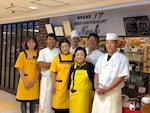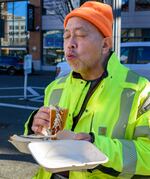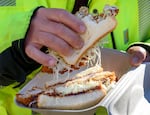
Taiki Nakajima, owner of Tokyo Sando food truck in downtown Portland, Ore., serves a box of Miso Katsu Sando sandwich to customer David Conklin on Nov. 27, 2023. The beloved food truck selling Japanese-style sandwiches is set to close on Sunday.
Winston Szeto / OPB
Update — Feb. 8, 2024: Tokyo Sando has announced on Instagram that it’s set to reopen at Midtown Beer Garden in downtown Portland on Friday, less than two months after its closure at Southwest Harvey Milk Street and Second Avenue. The new location is about three blocks away from the old location.
Original story below:
Chef Taiki Nakajima has bustled inside his food truck in downtown Portland for nearly four years, often occupied taking orders and seldom appearing at the cashier’s spot to engage with customers. When he does interact with them, it brightens his day.
“I can see the customers eating in front of me,” he said. “People tried my sandwiches and (if) they went to Japan, they just said, ‘Your sandwich is better than (in) Japan.’ I think that was really cool for me.”
Scores of people from Portland and beyond who’ve enjoyed Nakajima’s sandwiches have raved online about their rich umami flavors. A few customers who’ve lived in Japan have said his sandwiches brought back memories of their days in the country. The food cart has also drawn notice from food historians and globe-trotting gourmets. However, they’ll all soon need to search elsewhere to get a sando taste.
Tokyo Sando — “sando” means sandwich in Japanese — has been one of the few food businesses in Portland crafting and selling Japanese-style sandwiches. Other Japanese sando vendors in the area include Tanaka and Oyatsupan Bakers. These sandwiches feature Japanese milk bread slices filled with ingredients such as egg salad, deep-fried meat cutlets and deep-fried tofu.
Since opening in February 2020, Nakajima has been driven to share a taste of his home country’s food culture through his mobile catering business, Tokyo Sando. Initially based at the Portland State University campus, he purchased a truck a year later and moved it to its current spot at Harvey Milk Street and Second Avenue.
Despite the challenges posed by the COVID-19 pandemic, the food truck developed a sizable clientele, evident in its following of more than 21,000 accounts on Instagram and an overall Yelp rating of 4.5 based on 300-plus reviews.
Nakajima’s announcement in September of his decision to sell his truck and bid farewell to his sandwich business triggered an outpouring of sadness from his loyal customers. Sunday is his announced last day in business. He intends to head back to Japan for an extended break.

The Tokyo Sando food truck, located in a parking lot at the intersection of Harvey Milk Street and Second Avenue in downtown Portland. Taiki Nakajima says he recently sold the vehicle to a friend.
Winston Szeto / OPB
He cited rising food costs and declining revenue among the reasons for departing Portland, and said he’s unsure if he’ll return. Additionally, his parents, in their 60s, have hinted at his taking over their izakaya restaurant business in Tokyo.
“They keep working six days a week, and sometimes when I (have gone) back to Japan and I talked with them, they asked me, ‘Are you still being (in) America, or are you coming back?’” said Nakajima, 36.
Should he choose to remain in Tokyo and manage the restaurant, it would mark the completion of a decadelong journey traversing the globe.
Exploring food business ideas
During his youth in Tokyo, Nakajima aspired to become a professional baseball player. He says he wanted to avoid following in his parents’ footsteps as restaurant chefs who dedicated long hours at their restaurant. However, recognizing his lack of skill in the sport, he pursued dietetics at a local college with the aim of becoming a nutritionist.
Upon graduation, Nakajima worked as a chef at his parents’ restaurant for nearly a year before working as a nutritionist at health care institutions. After spending the first two decades of his life in Japan, however, he says he felt adrift. He sought to explore the world and to discern his true life’s calling.

In this undated supplied photo, Taiki Nakajima, second from left in the back row, poses with his mother, left in the front row, his father, first from right in the back row, and his grandmother, center in the front row, near his family-run izakaya restaurant in Tokyo, Japan.
Courtesy of Taiki Nakajima
His initial overseas journey led him to India, where he struggled due to his lack of proficiency in English. Later, he ventured to San Francisco to learn the language. Upon achieving fluency, he obtained an Australian working holiday visa and worked as a chef at a small cafe in Melbourne.
Nakajima set his feet in the United States in 2015 after getting a restaurant chef job in Philadelphia, where he met his American wife-to-be. Following their marriage, they embarked on a two-year global tour, exploring Italy, France, Vietnam, Thailand and various regions across the United States. (They are no longer together.)
“I just wanted to try…authentic food,” he said. “I wanted to hear the sound of languages.”
His cross-country U.S. journey brought him to Portland, where he landed a role as a line cook at a Japanese ramen restaurant in 2018. Nakajima said he initially contemplated launching his own ramen restaurant, but lacked the necessary funds. He considered a ramen food truck as a more cost-effective alternative but faced challenges maintaining water quality for a sound soup base in that setting.
In search of inspiration, he returned to Japan in 2019, exploring southern regions he hadn’t previously visited, including Honshu and Kyushu islands. This journey inspired the idea of a food truck specializing in Japanese-style sandwiches.
“I saw a foreigner holding the sandwich and a green tea, so I (was) like, ‘Even they’re in Japan, they eat sandwiches, so I should make sandwiches in Portland and just start making whatever I want.’”

Customers order and wait outside the Tokyo Sando food truck, which has more than 21,000 followers on Instagram and an overall rating of 4.5 on Yelp.
Winston Szeto / OPB
Sandwiches assimilated into Japanese cuisine
Sandwiches historically were considered a Western delicacy in Japan, given the prevalence of rice in the country’s diet. Bread was only integrated into Japanese cuisine in the mid-19th century, three centuries after the Portuguese introduced it to the country, according to food historian David Conklin.
Originally from Portland, Conklin earned a master’s degree from Portland State University focusing on the history of Japanese food in Oregon before World War II. He has now lived in Tokyo for more than a decade, where he writes on Japanese food history and guides non-Japanese tourists to local delicacies like sushi, soba noodles and tempura, while explaining the historical context of these foods.
Drawing from his research on early 20th-century cookbooks that targeted Japanese domestic helpers serving British expats in Yokohama, Conklin notes that the initial appearance of sandwiches in Japan were dainty and open-faced, often topped with ingredients like grilled chicken, eggs, and even animal brains and livers.
Closed-face sandwiches, he said, gained popularity post-World War II when Americans supplied surplus wheat to a Japan needing to feed a starving population. By the 1950s, sandwiches were fully assimilated into Japan’s food culture, incorporating local ingredients like tuna, anchovies and raw beef between two bread slices.
Related: With nature as her muse, Portland’s Gena Renaud handcrafts tiny pieces of delectable art
Conklin said Japanese-style sandwiches are a good example of diverse food cultures interacting in a globalized world. These sandwiches are widely available in convenience stores and department shops across Japan, enjoyed especially during cherry blossom viewings in spring.
“I eat sandwiches all the time,” he said. “If I’m not eating soba for lunch, I’ll be eating a sandwich.”
‘Over-the-top’ sandwich
Conklin paid his first visit to Tokyo Sando while in Portland for Thanksgiving last month, and was impressed by the steady flow of customers at the food truck. He commends Nakajima’s meticulous preparation, spending around 15 minutes on each sandwich despite occasional long queues.
He ordered a Miso Katsu Sando, a chicken cutlet sandwich with miso sauce that Nakajima said originates from Nagoya prefecture of central Honshu.
Tokyo Sando also offers the Naka Sando, which the chef says was inspired by chicken nanban, a fried chicken dish with tartar sauce originating in Kyushu’s Miyazaki prefecture.

Japanese food historian David Conklin, who grew up in Oregon, looks at the menu presented on the Tokyo Sando food truck on Nov. 27, 2023. He says he has never seen a sandwich similar to Tokyo Gyoza Scotch Egg Sando in Japan.
Winston Szeto / OPB
A newer addition to the menu, the Tokyo Gyoza Scotch Egg Sando, consists of a boiled egg wrapped in pork and other ingredients commonly found in Japanese pan-fried dumplings. Conklin described this sandwich as “a little bit over-the-top.”
“I’ve never seen anything like that in Japan,” he said, adding that sandwiches with fried pork or chicken are popular in Japan.
Nakajima said that he presented and named the sandwich this way to make it stand out. “It’s kind of hard to sell the food people don’t know, like gyoza,” he said. “I was thinking, ‘Just make scotch egg with gyoza filling,’ so it’s like Western-food-and-Asian-food fusion, and people like it.”
Gary Okazaki is a Portland-based gourmet who says he has frequented 20,000 restaurants locally and internationally since the 1960s, and is a frequent guest to “Right at the Fork,” a podcast series about Oregon’s food scene. Despite the novelty of the Tokyo Gyoza Scotch Egg Sando, he expressed a preference for the Pork Katsu Sando and hasn’t explored other options at Tokyo Sando during his recent visits.
“The pork katsu is just so moist, and the two times I’ve come this year, it’s been executed incredibly well, which surprised me for a food cart,” he said.
“I enjoy their bread too,” he continued. “So far, Tokyo Sando’s pork katsu sandos have been very consistent. The problem with a lot of places around here is inconsistency — dry pork, stale bread, condiments that aren’t fresh.”

Portland-based gourmet Gary Okazaki enjoys his katsu sando he bought from Tokyo Sando food truck. Okazaki praises Tokyo Sando for consistently delivering high-quality sandwiches.
Winston Szeto / OPB
Frustration with downtown crimes, addiction crisis
Okazaki lamented the imminent closure of Tokyo Sando: “They do something that is unique for Portland, and they do it at a high level, and it’s so unfortunate that they’re going away because of what downtown has become.”
Nakajima, while emphasizing his departure wasn’t due to distaste for the city, expressed frustration with repeated propane tank thefts from his food truck and with illicit drug transactions on the streets.
“That was really hard for me,” he said. “I was just kind of tired walking downtown (seeing) people were selling drugs in front of cars. I just want to make food.”
Oregon Gov. Tina Kotek has acknowledged the difficulties faced by downtown Portland in recent years, including crimes and addiction crisis, tarnishing the city’s appeal.
Related: Kotek’s recipe for Portland: More police and social workers, less plywood, trash and taxes
Nakajima said he toyed with the idea of relocating his food truck to Southeast or Northeast Portland or even Beaverton, but he doubted if shifting elsewhere could sustain his revenue, as his customer base mainly frequents downtown.
To eventually return or not to return to Portland, it’s still a big question for Nakajima. If he does not come back, Nakajima hopes his customers and the people of Portland will still remember his business motto: “We will take you to Tokyo.”
“It’s not selling only food — I want to connect people with Japan, so that’s why I’m doing this business.”

Taiki Nakajima stands behind the cash register station inside the Tokyo Sando food truck. He says he will return to Japan for an extended break and is still pondering whether to come back to Portland.
Winston Szeto / OPB

